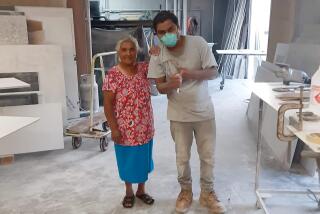Ex-IBM Workers’ Case Sent to Jury
- Share via
SANTA CLARA, Calif. — Two former IBM Corp. employees who developed cancer after long careers at a San Jose electronics factory didn’t get sick because of their exposure to chemicals at work, a lawyer for the company said Tuesday before the case accusing IBM of concealing work-related illnesses from workers went to the jury.
“You can’t conclude just because someone gets a disease working in industrial America that it’s tied to working with these chemicals -- at least not without proof,” the lawyer, Bob Weber, told the jurors. In this case, he said, “it didn’t happen. Chemicals didn’t do it.”
Alida Hernandez and James Moore are the first of more than 200 plaintiffs to argue in court that exposure to trichloroethylene, benzene and other chemicals at IBM’s hard disk drive and chip-making factories gave them cancer and caused their children to be born with birth defects.
The jury of one man and 11 women will begin deliberating today in the civil lawsuit against IBM. A guilty verdict requires nine votes. The jury will decide each case separately, although they were tried together.
The verdict could have enormous implications for IBM and other high-tech manufacturers that regard their industry as clean and safe. The next trial against Big Blue is set to begin next month in New York.
Before he sent them to begin deliberations, Santa Clara County Superior Court Judge Robert Baines gave jury members a strict set of instructions -- dictated by state law -- that experts say will make a victory for the former IBM workers difficult.
In California, most workplace injuries claims are covered under workers’ compensation laws. To win, Hernandez and Moore must persuade the jury that they suffered from “systemic chemical poisoning” at work; that IBM knew they were getting sick at work and didn’t tell them; and that IBM’s concealment caused the sickness to escalate and become cancer. Failure to prove any of those claims requires a not-guilty verdict, Baines told the jury.
Jeffrey Dintzer, a Los Angeles lawyer not connected to the case, said the plaintiffs faced “a substantial hurdle.”
Hernandez, 73, has said she often was splashed with chemicals used to coat and clean surfaces at IBM’s San Jose plant, where she worked for more than a dozen years. She was diagnosed with breast cancer in 1993 and had a mastectomy.
Moore, 62, was diagnosed with non-Hodgkin’s lymphoma after working in the same plant for more than 20 years. He complained of headaches, blurred vision, blackouts and severe nasal congestion.
But during his closing arguments, Weber said the plaintiffs’ lawyers relied on faulty assumptions, poor science and half-truths to make the claim that exposure to chemicals at work caused cancer.
Richard Alexander, a lawyer for the plaintiffs, countered that the IBM medical staff saw early signs that his clients were being systemically poisoned by chemicals used to coat hard disk drives and clean machines. For Hernandez, it was abnormal liver tests starting in 1981; for Moore, it was profuse nasal discharges starting in 1967.
“IBM maintained a cover-up within its own medical department because it wanted to minimize its safety and occupation claims,” Alexander argued during his rebuttal Tuesday.
The doctors and nurses never told his clients that their symptoms could be caused by the chemicals they used at work, Alexander said. But Weber said there was a simple explanation: The doctors didn’t believe that the chemicals were making Hernandez and Moore sick.
Medical experts testified during the four-month trial that both workers had risk factors for cancer. Moore is an obese white man over 50 who had smoked and worked on farms and whose mother died of lymphoma.
Hernandez is an obese woman over 50 who began menstruating at a very young age and had hormone replacement therapy.
“Working at IBM did not protect anyone from cancer,” Weber said. “It’s a scourge on the human population. That doesn’t mean it’s caused by work.”
Armonk, N.Y.-based IBM won a key ruling last week when Judge Baines limited the award the plaintiffs potentially could receive to actual damages, including medical costs, lost wages and pain and suffering, but ruled out punitive damages.
Hernandez asked for compensation for past medical expenses totaling $33,192. Moore asked for damages for past and future medical expenses, past and future lost wages and lost ability to take care of his household, totaling more than $300,000. Each also asked for damages for pain and suffering.
Weber urged the jury to clear the reputations of IBM’s medical team by awarding no money.
“If you give a verdict to plaintiffs for $100,000, or even $1, you’re making a finding that these good people committed fraud,” he said. “I don’t believe that’s justified by the evidence.”
Alexander replied, “Under no circumstances do they want to face the reality and the truth that came forth in this courtroom.”
Before ending his rebuttal, Alexander shook hands with his clients. “You are no longer in our hands,” he told Hernandez and Moore. Then he pointed to the jury and said, “You’re in their hands.”






